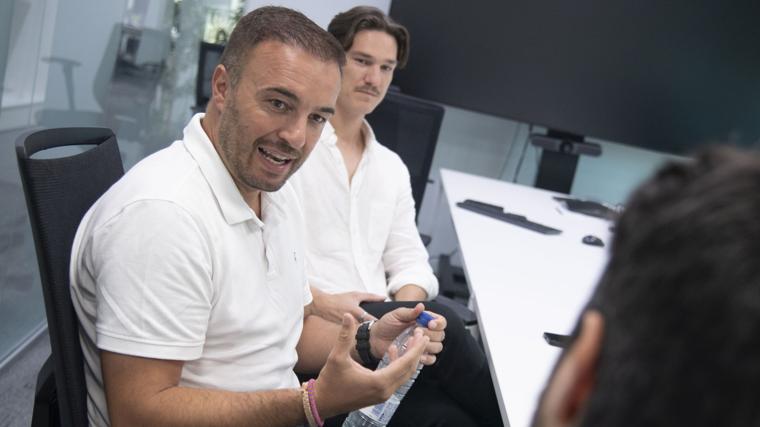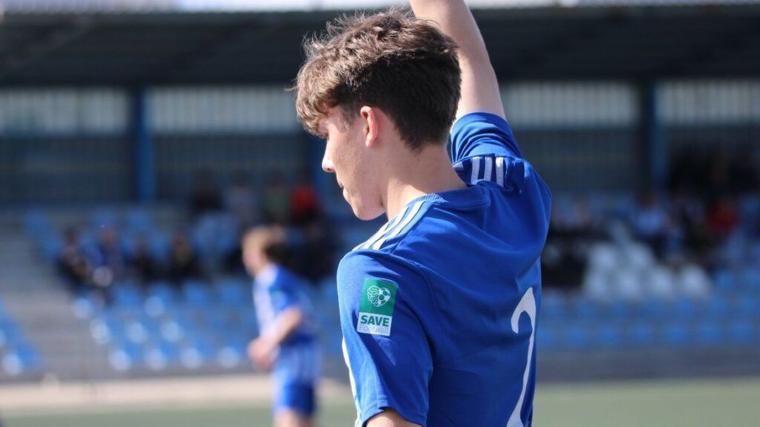'Save Football,' the crusade to save the king of sports: "If grassroots football rots, all football will end."

Soccer isn't the king of sports just because it's the most watched and consumed in the media, but because it's also the most practiced. According to the latest data through 2024—via Statista—there are 1.26 million registered soccer players in Spain, the vast majority of them men, despite the undeniable growth —now somewhat stagnant— on the women's side. Of these, a tiny fraction will reach professional level.
But that doesn't mean the dream is lost. The vast majority of these federation members dream of achieving the glory of playing in the First Division, lifting a Champions League title, or winning a Ballon d'Or. All of this requires years of dedication and education, which is sometimes written in perfect handwriting on straight lines, but also in crooked and often uncomfortable lines.
And it's true that, for some time now, on the increasingly scarce dirt and artificial turf fields where dreams are forged every weekend, the lineup is no longer the right one. Shouts from the stands, excessive pressure, violence toward referees and the children themselves , children who cry when they are substituted, and coaches more concerned with winning than with educating. Amidst all this noise, Save Football raises its voice with a brave, difficult, and almost utopian proposal: to rescue grassroots football from its foundations, with emotional training , human values, and common sense as its pillars. Because, if we don't act, the future of football could be lost before it even begins.
"My work made me realize something: sometimes, a coach can have more of an impact on a child's life than their own parents." Rubén Godoy speaks slowly but surely. For years, he managed youth football teams and recorded each experience in a notebook that ended up becoming a sort of guide in 2020. That publication, far from closing a chapter, set off an alarm bell: youth football needs help . And so Save Football was born .
This completely self-funded project aims to regenerate the grassroots football ecosystem from its very roots. It's not about training better. It's about educating better. Because, as Rubén emphasizes, "this isn't about producing footballers, it's about developing people." And to achieve this, he asserts, it's essential to re-educate everyone involved with the child footballer: coaches, parents, managers, and even institutions.
Save Football starts from a clear premise: grassroots football has a problem, and it's not the children. "We're seeing more and more frustration, more shouting from the stands, more violence on junior fields. But children aren't born with that. They learn it, they see it, they suffer it," laments Rubén. The project was born to break that chain of toxicity, starting with the adults.
"Some parents project their own frustrated dreams or senseless expectations of success onto their children. And they do it without realizing it," he points out. That's why Save Football has created an online training platform with highly visual, brief, and direct training sessions. "We wanted something that would really make people think. Something that would stir things up. That's why we asked questions like: What do you want your child to remember about you when they think about their football years? "
 Rubén Godoy and Diego Benito, heads of Save Football, during the interview in the ABC newsroom.
Belén Díaz
Rubén Godoy and Diego Benito, heads of Save Football, during the interview in the ABC newsroom.
Belén Díaz
One of the phrases Save Football repeats—and the one that most bothers many parents—is: "Your son probably won't be a professional footballer, and that's okay ." Far from sounding defeatist, the message is meant to be liberating. "The important thing isn't whether he makes it or not. It's how football has treated him along the way. If he's learned to live together, to fall and get up, to strive, to respect... Then it's been worth it," explains Diego Benito , one of the project's leaders.
In this sense, one of the project's pillars is training coaches in emotional skills and human values. "We focus too much on the blackboard and forget that the coach has an enormous emotional responsibility for the child. Sometimes they are the only stable adult figure in their life, even more important than parents or teachers. They are role models that can shape a person's entire life."
Save Football not only trains coaches and parents. It also offers clubs a seal of quality , a kind of badge that demonstrates their commitment to comprehensive education . "We want the seal to become an added value for clubs. Something that families recognize and value. To make it known which clubs are committed to healthy football, not just winning matches at all costs," they demand. This seal, which several clubs already have, such as CF Talavera de la Reina, CF Pozuelo de Alarcón, Marc Cucurella's campus , and CE Manacor, also has the endorsement of Míchel Sánchez , Girona's coach and one of its main ambassadors.
The most surprising thing, Rubén admits, has been the lack of institutional involvement. "We've presented the project to the Higher Sports Council , to regional federations... and the interest has been minimal. It seems that as long as the fields continue to fill up on Sundays, everything is fine," he criticizes. That's why they've opted for a direct approach with clubs and families. "We couldn't wait any longer. Change is urgent."
The authorities have praised the Save Football project, but nothing more. "What's the point of standing behind the 'No to Racism' banner if nothing else is done?" they lament. Save Football, moreover, is a perfect tool for complying with a legal imperative: the Child Protection Act, in force since 2021, which in theory should serve to safeguard the well-being of children, also in the field of sport.
Rubén also focuses on a recent phenomenon: the contamination of grassroots football by professionalism. "Now an 11-year-old child has an agent, a social media profile, and TikTok videos. They're valued by how many goals they score, not by how they behave." To illustrate this, he mentions what happened at Lamine Yamal's birthday party : "If you don't take care of the environment, if there isn't a solid emotional structure, pressure can destroy everything."
In this context, Save Football proposes real tools to build this environment: mandatory training for coaches, practical resources for parents, monitoring of the emotional climate within teams, and working with clubs to identify bad practices.
For that to happen, he says, we have to start now. In Tuesday's training session, on the bench, in the stands, and at home. "We don't want patch-ups or empty campaigns. We want action. We want to change football from the ground up." Because, as Rubén sums up, "if grassroots football rots, the whole game ends."
 A Talavera player with the 'Save Football' logo on his shoulder
SaVe Football
A Talavera player with the 'Save Football' logo on his shoulder
SaVe Football
The ultimate dream of Rubén, the driving force behind Save Football, is ambitious and bold: to transform Spanish football from the ground up to save it from its ills . In the medium term, there is already a clear goal: to put the project's seal of quality at the 2030 World Cup . The intention is to position Spain as a pioneer and benchmark in child training and protection, implementing a more humanistic model in grassroots football as a prelude to professional football and the society of the future. "What if we arrive at the World Cup with a generation trained not only technically, but also humanely? What if we become a global benchmark for how we treat our children on the fields?"
abc





